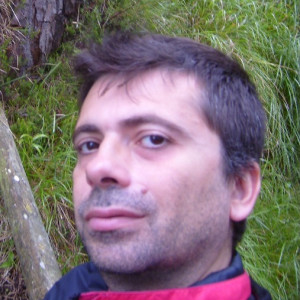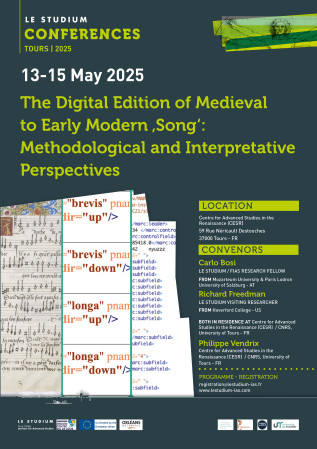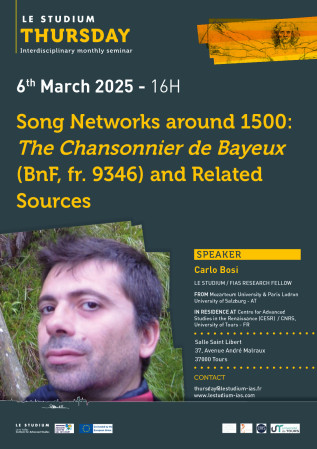Carlo Bosi

From
Mozarteum University & Paris Lodron University of Salzburg - AT
In residence at
Centre for Advanced Studies in the Renaissance (CESR) / CNRS, University of Tours - FR
Host scientist
Philippe Vendrix
BIOGRAPHY
D.Phil. at the University of Oxford (2004) with a dissertation on modality in the songs of Du Fay and Binchois. In 2004–2005 DAAD scholar at the Friedrich-Schiller-Universität Jena-Weimar and in 2006–2007 scholarship of the Norges Forskningsråd at the NTNU Trondheim with a project on chant in medieval Scandinavia. Research Fellow at City University, London between 2007 and 2009. From 2010 until 2017 postdoc and a senior postdoc on two FWF (Austrian Science Fund) projects on the borrowing and citation of French monophonic songs in polyphonic textures (https://chansonmelodies-sbg-ac.eu). Since 2019 senior postdoc at Salzburg University – and since November 2023 at Mozarteum University – in a research project exploring the relationship between literature of the Venetian “Accademici Incogniti” and libretti of early Venetian opera (https://operaincogniti.org/): a relevant monograph is currently in preparation for Peter Lang. My next planned research project concerns the operas by Antonio Caldara for Salzburg (1717-27).
PROJECT
The Chansonnier de Bayeux : An Early 16th-Century Monophonic Source and its Polyphonic Relatives
The manuscrit de Bayeux (F-Pnm, français 9346) and F-Pnm, français 12744 (chansonnier A) are unique musical sources, given that they are the only two anthologies from around 1500 transmitting a secular monophonic repertoire, sharing about one third of it. Until recently, there were few studies dedicated to either one or both sources and some are already dated. Moreover, most of these studies have rather focussed on the two chansonniers as sources for polyphonic arrangements on ‘pre-existent’ tunes, far less in the monophonic songs as independent artistic products in themselves. Only Isabel Kraft’s recent pioneering work on chansonnier A has considered these songs and the manuscript on their own terms, and the applicant’s proposed monograph aims to achieve comparable results for Bayeux. The monograph on Bayeux shall include a historical introduction, a codicological analysis of the source, a transcription of texts and melodies, with a parallel English translation of the texts, and a complete list of monophonic concordances and polyphonic arrangements. Additionally, particular attention will be devoted to songs shared by both monophonic chansonniers, including a detailed analysis of and comparison with polyphonic arrangements of these songs and to songs without a known polyphonic transmission, as well as to specific melodic formulas unique to Bayeux. It is also planned to devote some attention, in a final chapter, to the revival of some of these songs by modern folk-singers and singer-song writers.
It is finally envisaged to feed data concerning songs in Bayeux into the Ricercar Data Lab and include work on the manuscript in the digital infrastructure Cluster 6 Biblissima+. This will help spread knowledge and awareness on the relevance of monophonic song in the Renaissance and of this underrepresented repertoire. Additionally, the inclusion of Bayeux in the Cluster 6 Biblissima+ will enhance digital visibility of the manuscript.
 |
This project has received funding from the European Union’s Horizon 2020 research and innovation programme under the Marie Skłodowska-Curie grant agreement No 945408 |



